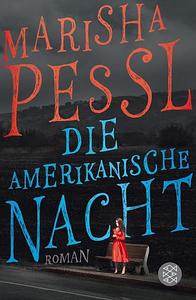Take a photo of a barcode or cover
I waited a long time to read this book because her first book was amazing. I was worried about being disappointed and ruining my memory of Calamity Physics. I didn’t need to worry. This book was fantastic.
This starts out kind of like a typical crime novel and winds up in some trippy places. Think [b:House of Leaves|24800|House of Leaves|Mark Z. Danielewski|https://i.gr-assets.com/images/S/compressed.photo.goodreads.com/books/1403889034l/24800._SX50_.jpg|856555] with more structure. It's definitely not like any other book I've read which is saying something.
The characters were my favourite part of the book, they are really well-drawn and distinct from each other with lots of nuance. After I finished this book, I still thought about it for a while afterwards. Something about this one stays with you.
The characters were my favourite part of the book, they are really well-drawn and distinct from each other with lots of nuance. After I finished this book, I still thought about it for a while afterwards. Something about this one stays with you.
i tend to judge books by how eagerly i pick them up while reading. from page one, i was consistently excited to be reading this. through the first third, i thought this could be a Perfect Book. mystery, horror, an investigation, conspiracy, suspected paranormal activity, cold cases, etc. mcgrath is flawed but not unlikeable, and pessl didn't waste pages focusing on anything other than the investigation at hand.
however, i think my high hopes from the first half were impossible to live up to, and i was disappointed with the end. the peak visit was described so frenetically that i had to re-read in a few parts, but it ended up not even mattering at all. it almost felt like lost (the TV show) - the premise, when introduced, was so inventive and interesting (seriously, is there anything better than season one of lost?), but at the end, it became clear that there was probably no way to end the story that would have been satisfying, or live up to the hype.
also, some people might think the mix of newspaper articles, pictures, police reports, etc. are gimmicky, but i like that kind of thing. but, they gotta make them look better on the kindle.
i was going to go 3 stars, but i'm still thinking a lot about this one. and that counts for something.
however, i think my high hopes from the first half were impossible to live up to, and i was disappointed with the end. the peak visit was described so frenetically that i had to re-read in a few parts, but it ended up not even mattering at all. it almost felt like lost (the TV show) - the premise, when introduced, was so inventive and interesting (seriously, is there anything better than season one of lost?), but at the end, it became clear that there was probably no way to end the story that would have been satisfying, or live up to the hype.
also, some people might think the mix of newspaper articles, pictures, police reports, etc. are gimmicky, but i like that kind of thing. but, they gotta make them look better on the kindle.
i was going to go 3 stars, but i'm still thinking a lot about this one. and that counts for something.
3.5 stars, 4 stars for the story, but the main character grated on me, unfortunate considering the book is told from his view point.
I really enjoyed Night Film and I have to say that it kept my attention all the way through, which at over 23 hours on audio is pretty impressive.
It’s a long books and tends toward sprawling in places. It meanders and we follow trail after trail that (maybe) go nowhere. It’s not a novel with answers, just more questions. And that’s even before McGrath (maybe) loses touch with reality a bit. This book is wonderful until it slides just over a line that makes you want to roll your eyes, but then it pulls itself back on track and you’re engrossed again.
You can read my whole review at Carol's Notebook.
It’s a long books and tends toward sprawling in places. It meanders and we follow trail after trail that (maybe) go nowhere. It’s not a novel with answers, just more questions. And that’s even before McGrath (maybe) loses touch with reality a bit. This book is wonderful until it slides just over a line that makes you want to roll your eyes, but then it pulls itself back on track and you’re engrossed again.
You can read my whole review at Carol's Notebook.
I like Marisha Pessl. I loved her book, "Special Topics in Calamity Physics." She writes eclectic novels. They differ decidedly from those of other authors. She has a unique style. And though I've had her "Night Film" book for a while, my work and other obligations prevented me from opening it. When I finally did, I expected to devour the book, licking my lips at the delicious prose.
Pessl writes well - but few can write nearly 600 pages and keep the prose taut and compelling all the way through. This book needed an editor.
It also needed more believability. True, the plot about the daughter of an Alfred Hitchcock-type director dying and the black magic signs of her death strain credulity, but what really caused me consternation were the three primary characters who investigate why she died. The lead character, Scott McGrath, is supposed to be a hot-shot investigative reporter, down on his luck. OK, but I was a reporter for 23 years, and no reporter I know ever did anything close to what McGrath does in the novel. He breaks about 28 different codes of ethics - which simply wouldn't be done by reporter.
Plus, McGrath seems to have an endless money supply. He's able to investigate the death for weeks, months, without ever getting a paycheck. Oh, and he helps subsidize his 19-year-old female assistant, an aspiring actress in NYC. He even allows her to move into his daughter's bedroom - which helps to end his joint custody. No father would do that.
And when the young woman wants to sleep with him, he rejects her. OK, some gentlemen would do that, but many men wouldn't.
In addition, he and Nora, his assistant, pair up with a drug dealer named Hopper who once knew the dead woman, of course.
I'm sorry. I like Marisha Pessl. I like her writing, even though she needs an editor. But those inconsistencies in character development cannot be overlooked. I look forward to her next book ... and I'll likely read it ... but not so hungrily next time.
Pessl writes well - but few can write nearly 600 pages and keep the prose taut and compelling all the way through. This book needed an editor.
It also needed more believability. True, the plot about the daughter of an Alfred Hitchcock-type director dying and the black magic signs of her death strain credulity, but what really caused me consternation were the three primary characters who investigate why she died. The lead character, Scott McGrath, is supposed to be a hot-shot investigative reporter, down on his luck. OK, but I was a reporter for 23 years, and no reporter I know ever did anything close to what McGrath does in the novel. He breaks about 28 different codes of ethics - which simply wouldn't be done by reporter.
Plus, McGrath seems to have an endless money supply. He's able to investigate the death for weeks, months, without ever getting a paycheck. Oh, and he helps subsidize his 19-year-old female assistant, an aspiring actress in NYC. He even allows her to move into his daughter's bedroom - which helps to end his joint custody. No father would do that.
And when the young woman wants to sleep with him, he rejects her. OK, some gentlemen would do that, but many men wouldn't.
In addition, he and Nora, his assistant, pair up with a drug dealer named Hopper who once knew the dead woman, of course.
I'm sorry. I like Marisha Pessl. I like her writing, even though she needs an editor. But those inconsistencies in character development cannot be overlooked. I look forward to her next book ... and I'll likely read it ... but not so hungrily next time.
The premise was interesting, the writing decent, and the plot twists intriguing, but there were a couple self-perceived flaws that I just couldn't wrap my mind around. First and foremost, where did McGrath get the money to pay for everything in this latest investigation? McGrath's career ended 5 years ago with him as a disgrace and he evidently hadn't worked since, yet he could spend literally thousands of dollars investigating Ashley's death? Secondly, a few times throughout the book, things seemed just a little too convenient. I'm not entirely sure how to explain what I mean or what could have fixed it, but in particular, people interviewed sure seemed to talk very easily this time around, so why didn't they last time? Lastly, I agree with others on here that the book could have been edited down a little without sacrificing any of the story.
This was so incredibly good, right up until the total letdown ending. Ugh.
The first thing that anyone needs to know about Night Film is that Marisha Pessl is obsessed with italics. This book is a minefield of the damn things, spread so frequently that it's impossible not to set one off.
Night Film is told from the perspective of a disgraced journalist, investigating the suicide of a reclusive cult film director's daughter. Instead of a teenaged ingenue of Special Topics in Calamity Physics, we have a slightly past it man incapable of dealing with his distant family - albeit a man with a seemingly limitless supply of money.
But Scott McGrath is not important, though his lens does manage to catch the interesting facets of his unlikely sidekicks: Night Film is a mystery and a self-fulfilling prophecy, a book that demands that you read on to find what happens next, even if you're not sure that you're going to like the answer. Most of the book is presented in bite sized chapters, but around the 80% mark it hits one uninterrupted set piece that is both ambitious and amazing, and it never really looks back.
Night Film is story about stories and where they come from, and it hits most of the marks that it sets up for itself. The mixed media aspects are never overly intrusive, although they're not exactly suited to the Kindle version, and overall this is a gripping and ultimately very satisfying book.
Night Film is told from the perspective of a disgraced journalist, investigating the suicide of a reclusive cult film director's daughter. Instead of a teenaged ingenue of Special Topics in Calamity Physics, we have a slightly past it man incapable of dealing with his distant family - albeit a man with a seemingly limitless supply of money.
But Scott McGrath is not important, though his lens does manage to catch the interesting facets of his unlikely sidekicks: Night Film is a mystery and a self-fulfilling prophecy, a book that demands that you read on to find what happens next, even if you're not sure that you're going to like the answer. Most of the book is presented in bite sized chapters, but around the 80% mark it hits one uninterrupted set piece that is both ambitious and amazing, and it never really looks back.
Night Film is story about stories and where they come from, and it hits most of the marks that it sets up for itself. The mixed media aspects are never overly intrusive, although they're not exactly suited to the Kindle version, and overall this is a gripping and ultimately very satisfying book.






